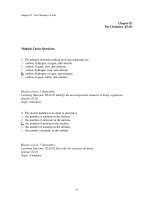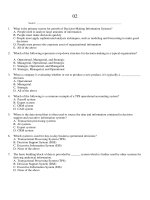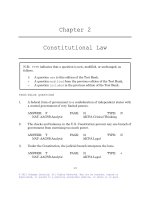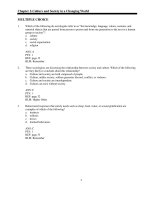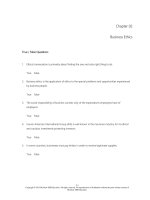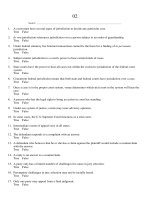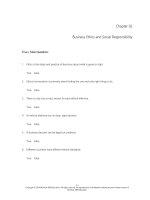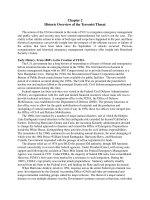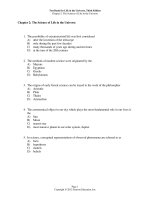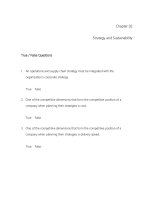Dynamic business law the essentials 3rd edition kubasek test bank
Bạn đang xem bản rút gọn của tài liệu. Xem và tải ngay bản đầy đủ của tài liệu tại đây (228.43 KB, 23 trang )
Chapter 02
Business Ethics and Social Responsibility
True / False Questions
1.
Ethics is the study and practice of decisions about what is good or right.
True
2.
Ethical conversation is primarily about finding the one and only right thing to do.
True
3.
False
A business decision can be legal but unethical.
True
6.
False
An ethical dilemma has no clear, right decision.
True
5.
False
There is only one correct answer for each ethical dilemma.
True
4.
False
False
Different countries have different ethical standards.
True
False
2-1
Copyright © 2016 McGraw-Hill Education. All rights reserved. No reproduction or distribution without the prior written consent of
McGraw-Hill Education.
7.
Stakeholders of a business consist of many different groups of people who are affected by the
business's decisions.
True
8.
Business managers should only consider customers when they engage in ethical reasoning.
True
9.
False
False
Employees as well as management are stakeholders of a business.
True
False
10. The social responsibility of a business is formed by expectations employees have of employers.
True
False
11. Values are positive abstractions that capture one's sense of what is good and desirable.
True
False
12. The universalization test provides that people should interact with others the way they would like
to be treated.
True
False
Multiple Choice Questions
2-2
Copyright © 2016 McGraw-Hill Education. All rights reserved. No reproduction or distribution without the prior written consent of
McGraw-Hill Education.
13. Business ethics:
A. Results in a set of correct decisions made by a company
B. Refers to a standard of business conduct
C. Can improve business decisions
D. Refers to a standard of business conduct and can improve business decisions
E. Results in a set of correct decisions made by a company and can improve business decisions
14. The expectations that a community places on the actions of a business are referred to as:
A. Social responsibility of business
B. Business ethics
C. Values
D. Standards of business conduct
E. Business decisions
15. Positive abstractions that capture one's sense of what is good and desirable are:
A. Ethics
B. Social responsibility of business
C. Values
D. The Golden Rule
E. Stakeholders
16. In 2011, Tyson Foods was charged with conspiracy and violation of the Foreign Corrupt Practice Act
for:
A. Selling mislabeled chicken parts to Canada
B. Bribing Mexican officials
C. Trademark infringement
D. Environmental violations
E. Securities fraud
2-3
Copyright © 2016 McGraw-Hill Education. All rights reserved. No reproduction or distribution without the prior written consent of
McGraw-Hill Education.
17. In 2007, Dole was sued by a group of its employees for:
A. Low wages
B. Age Discrimination
C. Bribery
D. Sex discrimination
E. Ignoring safety recommendations in their use of pesticides
18. Which of the following are stakeholders of a business?
A. Owners and employees
B. Employees and customers
C. Customers, owners, and management
D. Management, owners, and employees
E. Customers, owners, management, and employees
19. Positive abstractions that capture our sense of what is good or desirable are ______.
A. ethical ideas
B. values
C. conscience demands
D. desirable principles
E. action goals
20. The idea that we should interact with other people in a manner consistent with the manner in
which we would like for them to interact with us is called ______.
A. the Equalization Rule
B. the Ethical Realization Rule
C. the Silver Rule
D. the Golden Rule
E. the Ten Commandments Rule
2-4
Copyright © 2016 McGraw-Hill Education. All rights reserved. No reproduction or distribution without the prior written consent of
McGraw-Hill Education.
21. The "public disclosure" test is also known as the ______ test.
A. television
B. Powell
C. self-conscious
D. golden
E. primary
22. If we consider what the world would be like if a decision is copied by everyone else, we would be
using which of the following ethical guidelines?
A. Golden Rule
B. Universalization Test
C. Public Disclosure
D. Relevant Disclosure
E. World Rule
2-5
Copyright © 2016 McGraw-Hill Education. All rights reserved. No reproduction or distribution without the prior written consent of
McGraw-Hill Education.
23. Environmental Concerns. Connie, the president of a company that makes paper, has a new interest
in the environment. She recently went to a seminar on environmental dangers and has decided to
take steps to clean things up. She started at home and was also committed to change things at
work. Connie had to face the fact that her company has been cheating and is not in compliance
with applicable environmental regulations due to dumping in a nearby river. Her company has
never been cited, however, because it employs a very large number of people in the community,
including the mayor's wife and the chief-of-police's brother. On her mission to clean things up,
Connie has decided to go even further than the law requires and install the very latest
environmental protections. When she announced her plan, the chair of the company's board of
directors, Brooke, had a meeting with Connie. Brooke told Connie to analyze the situation carefully
because the cost of the additional equipment would mean no dividend to shareholders and no
raise for employees. Furthermore, Brooke told Connie that installing all the new equipment would
result in higher prices for the company's paper products and could bankrupt the company
because of foreign competition. Brooke hinted that Connie could be fired if she persisted. Brooke
suggested that Connie just be concerned with a minimal standard of ethics. Which of the following
is the minimal standard that a business must meet in a consideration of business ethics?
A. Decisions must be legal.
B. Decisions must meet the criteria of a follower of the WPH Framework for Business Ethics.
C. Decisions must meet the requirements of the most important stakeholders.
D. Decisions must receive a majority vote of acceptance by employees.
E. Both that decisions must be legal and that decisions receive a majority vote of acceptance by
employees.
2-6
Copyright © 2016 McGraw-Hill Education. All rights reserved. No reproduction or distribution without the prior written consent of
McGraw-Hill Education.
24. Environmental Concerns. Connie, the president of a company that makes paper, has a new interest
in the environment. She recently went to a seminar on environmental dangers and has decided to
take steps to clean things up. She started at home and was also committed to change things at
work. Connie had to face the fact that her company has been cheating and is not in compliance
with applicable environmental regulations due to dumping in a nearby river. Her company has
never been cited, however, because it employs a very large number of people in the community,
including the mayor's wife and the chief-of-police's brother. On her mission to clean things up,
Connie has decided to go even further than the law requires and install the very latest
environmental protections. When she announced her plan, the chair of the company's board of
directors, Brooke, had a meeting with Connie. Brooke told Connie to analyze the situation carefully
because the cost of the additional equipment would mean no dividend to shareholders and no
raise for employees. Furthermore, Brooke told Connie that installing all the new equipment would
result in higher prices for the company's paper products and could bankrupt the company
because of foreign competition. Brooke hinted that Connie could be fired if she persisted. Brooke
suggested that Connie just be concerned with a minimal standard of ethics. Which of the following
would be a stakeholder in the company?
A. The community only
B. The shareholders only
C. Future generations only
D. The community and shareholders only
E. The community, shareholders, and future generations
2-7
Copyright © 2016 McGraw-Hill Education. All rights reserved. No reproduction or distribution without the prior written consent of
McGraw-Hill Education.
25. Environmental Concerns. Connie, the president of a company that makes paper, has a new interest
in the environment. She recently went to a seminar on environmental dangers and has decided to
take steps to clean things up. She started at home and was also committed to change things at
work. Connie had to face the fact that her company has been cheating and is not in compliance
with applicable environmental regulations due to dumping in a nearby river. Her company has
never been cited, however, because it employs a very large number of people in the community,
including the mayor's wife and the chief-of-police's brother. On her mission to clean things up,
Connie has decided to go even further than the law requires and install the very latest
environmental protections. When she announced her plan, the chair of the company's board of
directors, Brooke, had a meeting with Connie. Brooke told Connie to analyze the situation carefully
because the cost of the additional equipment would mean no dividend to shareholders and no
raise for employees. Furthermore, Brooke told Connie that installing all the new equipment would
result in higher prices for the company's paper products and could bankrupt the company
because of foreign competition. Brooke hinted that Connie could be fired if she persisted. Brooke
suggested that Connie just be concerned with a minimal standard of ethics. Connie, however,
decides to go forward with her plan to clean things up under the theory that she wants to treat
others in the same manner that she wants to be treated. Under Connie's theory, if she did not
understand the importance of the environmental improvements, she would want them to be thrust
upon her. Connie's idea is best referred to as ______.
A. the Golden Rule
B. the Disclosure Principle
C. the Help Peers Test
D. the Sarbanes-Oxley Rule
E. the Greenhouse Rule
2-8
Copyright © 2016 McGraw-Hill Education. All rights reserved. No reproduction or distribution without the prior written consent of
McGraw-Hill Education.
Essay Questions
26. Explain the WH process of ethical decision-making.
2-9
Copyright © 2016 McGraw-Hill Education. All rights reserved. No reproduction or distribution without the prior written consent of
McGraw-Hill Education.
Chapter 02 Business Ethics and Social Responsibility Answer Key
True / False Questions
1.
Ethics is the study and practice of decisions about what is good or right.
TRUE
Ethics is the study and practice of decisions about what is good or right.
AACSB: Ethics
Accessibility: Keyboard Navigation
Blooms: Remember
Difficulty: 1 Easy
Learning Objective: 02-01 What are business ethics and the social responsibility of business?
Topic: Business Law and Business Ethics
2.
Ethical conversation is primarily about finding the one and only right thing to do.
FALSE
Business ethics refers to standards ofbusiness conduct, not a set of correct decisions.
AACSB: Ethics
Accessibility: Keyboard Navigation
Blooms: Understand
Difficulty: 2 Medium
Learning Objective: 02-01 What are business ethics and the social responsibility of business?
Topic: Business Law and Business Ethics
2-10
Copyright © 2016 McGraw-Hill Education. All rights reserved. No reproduction or distribution without the prior written consent of
McGraw-Hill Education.
3.
There is only one correct answer for each ethical dilemma.
FALSE
An ethical dilemma has no clear, right decision.
AACSB: Ethics
Accessibility: Keyboard Navigation
Blooms: Understand
Difficulty: 2 Medium
Learning Objective: 02-01 What are business ethics and the social responsibility of business?
Topic: Business Law and Business Ethics
4.
An ethical dilemma has no clear, right decision.
TRUE
An ethical dilemma has no clear, right decision.
AACSB: Ethics
Accessibility: Keyboard Navigation
Blooms: Understand
Difficulty: 2 Medium
Learning Objective: 02-01 What are business ethics and the social responsibility of business?
Topic: Business Law and Business Ethics
5.
A business decision can be legal but unethical.
TRUE
A business decision can be legal but unethical.
AACSB: Ethics
Accessibility: Keyboard Navigation
Blooms: Apply
Difficulty: 3 Hard
Learning Objective: 02-02 How are business law and business ethics related?
Topic: Business Law and Business Ethics
2-11
Copyright © 2016 McGraw-Hill Education. All rights reserved. No reproduction or distribution without the prior written consent of
McGraw-Hill Education.
6.
Different countries have different ethical standards.
TRUE
Different countries have different ethical standards.
AACSB: Ethics
Accessibility: Keyboard Navigation
Blooms: Remember
Difficulty: 1 Easy
Learning Objective: 02-02 How are business law and business ethics related?
Topic: Business Law and Business Ethics
7.
Stakeholders of a business consist of many different groups of people who are affected by the
business's decisions.
TRUE
Stakeholders of a business consist of many different groups of people who are affected by the
business's decisions.
AACSB: Ethics
Accessibility: Keyboard Navigation
Blooms: Remember
Difficulty: 1 Easy
Learning Objective: 02-05 How can we use the WH framework to make ethical business decisions?
Topic: The WH Framework for Business Ethics
8.
Business managers should only consider customers when they engage in ethical reasoning.
FALSE
Business managers must consider all relevant stakeholders when they engage in ethical
reasoning.
AACSB: Ethics
Accessibility: Keyboard Navigation
Blooms: Understand
Difficulty: 2 Medium
2-12
Copyright © 2016 McGraw-Hill Education. All rights reserved. No reproduction or distribution without the prior written consent of
McGraw-Hill Education.
Learning Objective: 02-05 How can we use the WH framework to make ethical business decisions?
Topic: The WH Framework for Business Ethics
9.
Employees as well as management are stakeholders of a business.
TRUE
Employees as well as management are stakeholders of a business.
AACSB: Ethics
Accessibility: Keyboard Navigation
Blooms: Remember
Difficulty: 1 Easy
Learning Objective: 02-05 How can we use the WH framework to make ethical business decisions?
Topic: The WH Framework for Business Ethics
10.
The social responsibility of a business is formed by expectations employees have of employers.
FALSE
The social responsibility of business consists of the expectations the community imposes on
firms doing business within its borders.
AACSB: Ethics
Accessibility: Keyboard Navigation
Blooms: Understand
Difficulty: 2 Medium
Learning Objective: 02-02 How are business law and business ethics related?
Topic: Business Law and Business Ethics
11.
Values are positive abstractions that capture one's sense of what is good and desirable.
TRUE
Values are positive abstractions that capture one's sense of what is good and desirable.
AACSB: Ethics
Accessibility: Keyboard Navigation
Blooms: Remember
Difficulty: 1 Easy
2-13
Copyright © 2016 McGraw-Hill Education. All rights reserved. No reproduction or distribution without the prior written consent of
McGraw-Hill Education.
Learning Objective: 02-03 What are values?
Topic: Business Law and Business Ethics
12.
The universalization test provides that people should interact with others the way they would
like to be treated.
FALSE
The golden rule provides that people should interact with others the way they would like to be
treated.
AACSB: Ethics
Accessibility: Keyboard Navigation
Blooms: Remember
Difficulty: 1 Easy
Learning Objective: 02-04 How do values provide a starting point for thinking about business ethics?
Topic: Business Law and Business Ethics
Multiple Choice Questions
13.
Business ethics:
A. Results in a set of correct decisions made by a company
B. Refers to a standard of business conduct
C. Can improve business decisions
D. Refers to a standard of business conduct and can improve business decisions
E. Results in a set of correct decisions made by a company and can improve business decisions
Business ethics refers to a standard of business conduct and can improve business decisions.
AACSB: Ethics
Accessibility: Keyboard Navigation
Blooms: Understand
Difficulty: 2 Medium
Learning Objective: 02-01 What are business ethics and the social responsibility of business?
2-14
Copyright © 2016 McGraw-Hill Education. All rights reserved. No reproduction or distribution without the prior written consent of
McGraw-Hill Education.
Topic: Business Law and Business Ethics
14.
The expectations that a community places on the actions of a business are referred to as:
A. Social responsibility of business
B. Business ethics
C. Values
D. Standards of business conduct
E. Business decisions
The expectations that a community places on the actions of a business is referred to as social
responsibility of business.
AACSB: Ethics
Accessibility: Keyboard Navigation
Blooms: Remember
Difficulty: 1 Easy
Learning Objective: 02-01 What are business ethics and the social responsibility of business?
Topic: Business Law and Business Ethics
15.
Positive abstractions that capture one's sense of what is good and desirable are:
A. Ethics
B. Social responsibility of business
C. Values
D. The Golden Rule
E. Stakeholders
Values are positive abstractions that capture one's sense of what is good and desirable.
AACSB: Ethics
Accessibility: Keyboard Navigation
Blooms: Remember
Difficulty: 1 Easy
Learning Objective: 02-03 What are values?
Topic: Business Law and Business Ethics
2-15
Copyright © 2016 McGraw-Hill Education. All rights reserved. No reproduction or distribution without the prior written consent of
McGraw-Hill Education.
16.
In 2011, Tyson Foods was charged with conspiracy and violation of the Foreign Corrupt Practice
Act for:
A. Selling mislabeled chicken parts to Canada
B. Bribing Mexican officials
C. Trademark infringement
D. Environmental violations
E. Securities fraud
In 2011, Tyson Foods was charged with conspiracy and violation of the Foreign Corrupt Practice
Act for bribing Mexican officials.
AACSB: Ethics
Accessibility: Keyboard Navigation
Blooms: Remember
Difficulty: 1 Easy
Learning Objective: 02-05 How can we use the WH framework to make ethical business decisions?
Topic: The WH Framework for Business Ethics
17.
In 2007, Dole was sued by a group of its employees for:
A. Low wages
B. Age Discrimination
C. Bribery
D. Sex discrimination
E. Ignoring safety recommendations in their use of pesticides
In 2007, Dole was sued by a group of its employees for ignoring safety recommendations in
their use of pesticides.
AACSB: Ethics
Accessibility: Keyboard Navigation
Blooms: Remember
Difficulty: 1 Easy
Learning Objective: 02-04 How do values provide a starting point for thinking about business ethics?
Topic: Business Law and Business Ethics
2-16
Copyright © 2016 McGraw-Hill Education. All rights reserved. No reproduction or distribution without the prior written consent of
McGraw-Hill Education.
18.
Which of the following are stakeholders of a business?
A. Owners and employees
B. Employees and customers
C. Customers, owners, and management
D. Management, owners, and employees
E. Customers, owners, management, and employees
The stakeholders of a firm are the many groups of people affected by the firm's decisions.
AACSB: Ethics
Accessibility: Keyboard Navigation
Blooms: Remember
Difficulty: 1 Easy
Learning Objective: 02-05 How can we use the WH framework to make ethical business decisions?
Topic: The WH Framework for Business Ethics
19.
Positive abstractions that capture our sense of what is good or desirable are ______.
A. ethical ideas
B. values
C. conscience demands
D. desirable principles
E. action goals
Values are positive abstractions that capture our sense of what is good or desirable and are
ideas that underlie conversations about business ethics.
AACSB: Ethics
Accessibility: Keyboard Navigation
Blooms: Understand
Difficulty: 2 Medium
Learning Objective: 02-03 What are values?
Topic: Business Law and Business Ethics
2-17
Copyright © 2016 McGraw-Hill Education. All rights reserved. No reproduction or distribution without the prior written consent of
McGraw-Hill Education.
20.
The idea that we should interact with other people in a manner consistent with the manner in
which we would like for them to interact with us is called ______.
A. the Equalization Rule
B. the Ethical Realization Rule
C. the Silver Rule
D. the Golden Rule
E. the Ten Commandments Rule
The Golden Rule is the idea that we should interact with other people in a manner consistent
with the way we would like them to interact with us.
AACSB: Ethics
Accessibility: Keyboard Navigation
Blooms: Understand
Difficulty: 2 Medium
Learning Objective: 02-05 How can we use the WH framework to make ethical business decisions?
Topic: The WH Framework for Business Ethics
21.
The "public disclosure" test is also known as the ______ test.
A. television
B. Powell
C. self-conscious
D. golden
E. primary
The public disclosure test is sometimes called the "television test," for it requires us to imagine
that our actions are being broadcast on national television.
AACSB: Ethics
Accessibility: Keyboard Navigation
Blooms: Understand
Difficulty: 2 Medium
Learning Objective: 02-05 How can we use the WH framework to make ethical business decisions?
Topic: The WH Framework for Business Ethics
2-18
Copyright © 2016 McGraw-Hill Education. All rights reserved. No reproduction or distribution without the prior written consent of
McGraw-Hill Education.
22.
If we consider what the world would be like if a decision is copied by everyone else, we would
be using which of the following ethical guidelines?
A. Golden Rule
B. Universalization Test
C. Public Disclosure
D. Relevant Disclosure
E. World Rule
Before we act, the universalization test asks us to consider what the world would be like were
our decision copied by everyone else.
AACSB: Ethics
Accessibility: Keyboard Navigation
Blooms: Understand
Difficulty: 2 Medium
Learning Objective: 02-05 How can we use the WH framework to make ethical business decisions?
Topic: The WH Framework for Business Ethics
2-19
Copyright © 2016 McGraw-Hill Education. All rights reserved. No reproduction or distribution without the prior written consent of
McGraw-Hill Education.
23.
Environmental Concerns. Connie, the president of a company that makes paper, has a new
interest in the environment. She recently went to a seminar on environmental dangers and has
decided to take steps to clean things up. She started at home and was also committed to
change things at work. Connie had to face the fact that her company has been cheating and is
not in compliance with applicable environmental regulations due to dumping in a nearby river.
Her company has never been cited, however, because it employs a very large number of
people in the community, including the mayor's wife and the chief-of-police's brother. On her
mission to clean things up, Connie has decided to go even further than the law requires and
install the very latest environmental protections. When she announced her plan, the chair of the
company's board of directors, Brooke, had a meeting with Connie. Brooke told Connie to
analyze the situation carefully because the cost of the additional equipment would mean no
dividend to shareholders and no raise for employees. Furthermore, Brooke told Connie that
installing all the new equipment would result in higher prices for the company's paper products
and could bankrupt the company because of foreign competition. Brooke hinted that Connie
could be fired if she persisted. Brooke suggested that Connie just be concerned with a minimal
standard of ethics. Which of the following is the minimal standard that a business must meet in
a consideration of business ethics?
A. Decisions must be legal.
B. Decisions must meet the criteria of a follower of the WPH Framework for Business Ethics.
C. Decisions must meet the requirements of the most important stakeholders.
D. Decisions must receive a majority vote of acceptance by employees.
E. Both that decisions must be legal and that decisions receive a majority vote of acceptance
by employees.
The legality of a decision is the minimal standard that must be met in a consideration of
business ethics.
AACSB: Ethics
Accessibility: Keyboard Navigation
Blooms: Apply
Difficulty: 3 Hard
Learning Objective: 02-02 How are business law and business ethics related?
Topic: Business Law and Business Ethics
2-20
Copyright © 2016 McGraw-Hill Education. All rights reserved. No reproduction or distribution without the prior written consent of
McGraw-Hill Education.
24.
Environmental Concerns. Connie, the president of a company that makes paper, has a new
interest in the environment. She recently went to a seminar on environmental dangers and has
decided to take steps to clean things up. She started at home and was also committed to
change things at work. Connie had to face the fact that her company has been cheating and is
not in compliance with applicable environmental regulations due to dumping in a nearby river.
Her company has never been cited, however, because it employs a very large number of
people in the community, including the mayor's wife and the chief-of-police's brother. On her
mission to clean things up, Connie has decided to go even further than the law requires and
install the very latest environmental protections. When she announced her plan, the chair of the
company's board of directors, Brooke, had a meeting with Connie. Brooke told Connie to
analyze the situation carefully because the cost of the additional equipment would mean no
dividend to shareholders and no raise for employees. Furthermore, Brooke told Connie that
installing all the new equipment would result in higher prices for the company's paper products
and could bankrupt the company because of foreign competition. Brooke hinted that Connie
could be fired if she persisted. Brooke suggested that Connie just be concerned with a minimal
standard of ethics. Which of the following would be a stakeholder in the company?
A. The community only
B. The shareholders only
C. Future generations only
D. The community and shareholders only
E. The community, shareholders, and future generations
Stakeholders of a firm are the many groups of people affected by the firm's decisions.
AACSB: Ethics
Accessibility: Keyboard Navigation
Blooms: Apply
Difficulty: 2 Medium
Learning Objective: 02-05 How can we use the WH framework to make ethical business decisions?
Topic: The WH Framework for Business Ethics
2-21
Copyright © 2016 McGraw-Hill Education. All rights reserved. No reproduction or distribution without the prior written consent of
McGraw-Hill Education.
25.
Environmental Concerns. Connie, the president of a company that makes paper, has a new
interest in the environment. She recently went to a seminar on environmental dangers and has
decided to take steps to clean things up. She started at home and was also committed to
change things at work. Connie had to face the fact that her company has been cheating and is
not in compliance with applicable environmental regulations due to dumping in a nearby river.
Her company has never been cited, however, because it employs a very large number of
people in the community, including the mayor's wife and the chief-of-police's brother. On her
mission to clean things up, Connie has decided to go even further than the law requires and
install the very latest environmental protections. When she announced her plan, the chair of the
company's board of directors, Brooke, had a meeting with Connie. Brooke told Connie to
analyze the situation carefully because the cost of the additional equipment would mean no
dividend to shareholders and no raise for employees. Furthermore, Brooke told Connie that
installing all the new equipment would result in higher prices for the company's paper products
and could bankrupt the company because of foreign competition. Brooke hinted that Connie
could be fired if she persisted. Brooke suggested that Connie just be concerned with a minimal
standard of ethics. Connie, however, decides to go forward with her plan to clean things up
under the theory that she wants to treat others in the same manner that she wants to be
treated. Under Connie's theory, if she did not understand the importance of the environmental
improvements, she would want them to be thrust upon her. Connie's idea is best referred to as
______.
A. the Golden Rule
B. the Disclosure Principle
C. the Help Peers Test
D. the Sarbanes-Oxley Rule
E. the Greenhouse Rule
The Golden Rule represents the idea that we should interact with other people in a manner
consistent with the way we would like them to interact with us.
AACSB: Ethics
Accessibility: Keyboard Navigation
Blooms: Apply
Difficulty: 2 Medium
Learning Objective: 02-05 How can we use the WH framework to make ethical business decisions?
Topic: The WH Framework for Business Ethics
2-22
Copyright © 2016 McGraw-Hill Education. All rights reserved. No reproduction or distribution without the prior written consent of
McGraw-Hill Education.
Essay Questions
26.
Explain the WH process of ethical decision-making.
In regard to the WH framework, students should reference who is involved, meaning
stakeholders; the purpose decisions are made, referencing values; and how decisions are made,
referencing ethical guidelines such as the Golden Rule.
AACSB: Ethics
Blooms: Understand
Difficulty: 2 Medium
Learning Objective: 02-05 How can we use the WH framework to make ethical business decisions?
Topic: The WH Framework for Business Ethics
2-23
Copyright © 2016 McGraw-Hill Education. All rights reserved. No reproduction or distribution without the prior written consent of
McGraw-Hill Education.
